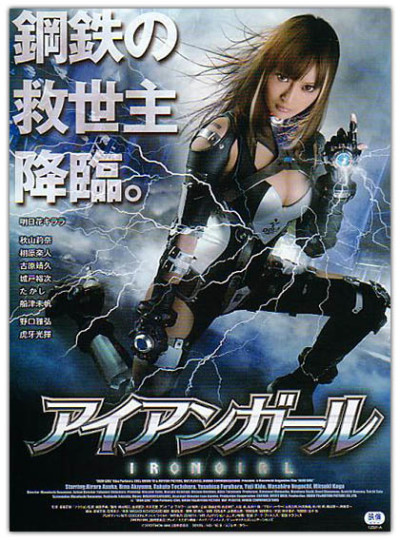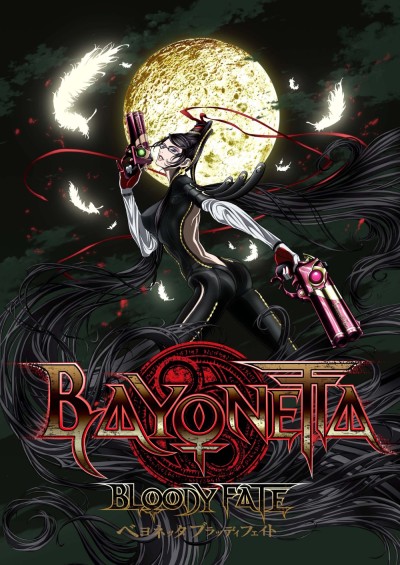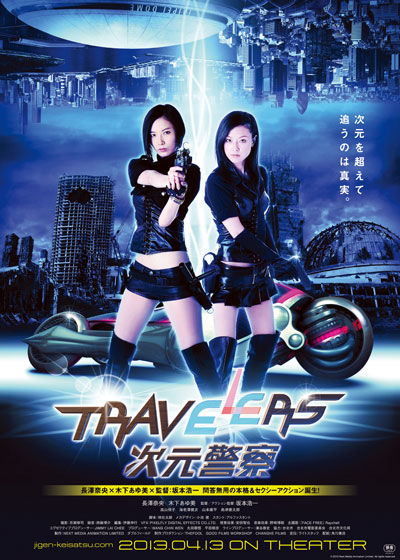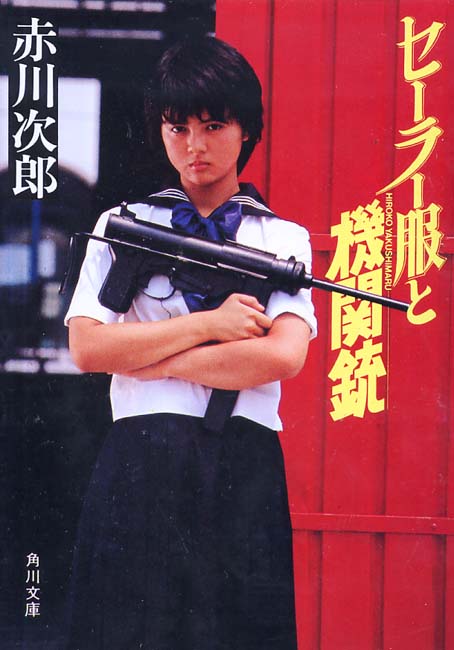★★½
“The Somewhat-magnificent One”
 The introduction tries to make it seem as if this could take place at any point in history, but there’s not much effort put into maintaining the illusion. The guns and overall setting – best described as “distressed warehouse” – puts this firmly into the post-apocalypse genre, though it’s very much at the bargain basement end of the spectrum. The heroine (adult actress Asuka) stumbles across naively innocent Anne (Akiyama), being pawed by some bad guys after straying into the danger zone to pick flowers; clearly a kinder, gentler apocalypse. After punching them out, assisted by remarkable reactions and her metal exo-skeleton, Anne is escorted back to her
The introduction tries to make it seem as if this could take place at any point in history, but there’s not much effort put into maintaining the illusion. The guns and overall setting – best described as “distressed warehouse” – puts this firmly into the post-apocalypse genre, though it’s very much at the bargain basement end of the spectrum. The heroine (adult actress Asuka) stumbles across naively innocent Anne (Akiyama), being pawed by some bad guys after straying into the danger zone to pick flowers; clearly a kinder, gentler apocalypse. After punching them out, assisted by remarkable reactions and her metal exo-skeleton, Anne is escorted back to her warehouse village, where we discover they are frequently raided by the Crazy Dogs gang.
They are under the imaginatively-named Crazy Joe (Koga), who looks a cosplay version of Captain Jack Sparrow, down to the headsquare and mascara. The village elder pulls out a parchment and pronounces “Iron Girl” to be the saviour of prophecy, even though she has no memories of her life, or even her name. The Crazy Dogs are less convinced, though come around after a fat minion and his low-level sidekicks are dispatched, and Anne’s brother, who has been re-programmed to forget his original identity, has his brainwashing undone. Joe and his sadistic girlfriend decide to pop over for a visit, to find out what all the fuss is about. Turns out, he and Iron Girl have more than a little in common…
I suppose, for what this is, it’s okay. However, what it is, isn’t much to begin with. There’s never any feeling of a convincing setting, the characters are paint-by-numbers, and the action is neither realistic enough to have any impact, nor stylized and excessive enough to be entertaining. Nagamine seems to know only one approach: slow down the action, to give the impression that Iron Girl is moving much faster than she actually is. It’s not very effective, and it’s also incredibly overused. The low-budget roots are also apparent, in an excess of static, talky scenes where people are just sitting around and talking. However, it’s not all bad. Asuka does a decent job as the stoic gunslinger without a past, and despite my snark above, I actually enjoyed Koga’s scenery chewing, which is entirely appropriate for the villain in this sort of thing.
Undemanding fans of SF will probably find this an adequate time-passer, and I likely fall into that category myself: it has just about enough action to sustain interest, especially in the second half. However, anyone going off the title, and expecting something even vaguely along the lines of a certain Marvel superhero film, is going to be horribly disappointed. So it’s probably about managing your expectations. The lower those are, the more likely this is to reach them.
Dir: Masatoshi Nagamine
Star: Kirara Asuka, Rina Akiyama, Mitsuki Koga, Yasuhisa Furuhara





 It takes real effort for a film that’s barely an hour long, significantly to overstay its welcome, but SBG manages to do exactly that, thanks to its woeful combination of shoddy action and tedious sex scenes. The heroine is teenager Mirai Asamiya (Hashimoto, about as much an actual teenager as I am), who has been transferred to a new school at the behest of her father. Little does she know, at least initially, that she is simply a tool for his revenge, headmaster Bush (Hotaru) having seduced Mirai’s mother away from her husband, and run off with her. To this end, Mirai has been brought up with what we should call, a very particular set of skills: we’ll spare you the details of exactly what the “Venus Crush” involves, but it does lead to the classic line, “He doesn’t know how dangerous your vagina is!” Before she can reach her target, she has to get close by dethroning and replacing his current enforcer of discipline, Susan (Taguchi), and also get past Bush’s lesbian daughter (Kiyokawa).
It takes real effort for a film that’s barely an hour long, significantly to overstay its welcome, but SBG manages to do exactly that, thanks to its woeful combination of shoddy action and tedious sex scenes. The heroine is teenager Mirai Asamiya (Hashimoto, about as much an actual teenager as I am), who has been transferred to a new school at the behest of her father. Little does she know, at least initially, that she is simply a tool for his revenge, headmaster Bush (Hotaru) having seduced Mirai’s mother away from her husband, and run off with her. To this end, Mirai has been brought up with what we should call, a very particular set of skills: we’ll spare you the details of exactly what the “Venus Crush” involves, but it does lead to the classic line, “He doesn’t know how dangerous your vagina is!” Before she can reach her target, she has to get close by dethroning and replacing his current enforcer of discipline, Susan (Taguchi), and also get past Bush’s lesbian daughter (Kiyokawa). I might have enjoyed this more, if I hadn’t recently sat through 25 episodes of basically the same plot, in Blood+. Generic anime storyline, #7: supernatural entity, trying to bring about the end of the world because… That’s what they do? In this case, there are sages and witches, who balance good and evil. 500 years ago, however, one from each side united, and the offspring was Bayonetta (Tanaka). She is now taking out angels, but there’s also a religious cult preparing for the rebirth of their saviour, a journalist who blames Bayonetta for the death of his father, and a mysterious, very whiny little girl, who keeps calling her “Mommy”. Who that turns out to be will surprise no one.
I might have enjoyed this more, if I hadn’t recently sat through 25 episodes of basically the same plot, in Blood+. Generic anime storyline, #7: supernatural entity, trying to bring about the end of the world because… That’s what they do? In this case, there are sages and witches, who balance good and evil. 500 years ago, however, one from each side united, and the offspring was Bayonetta (Tanaka). She is now taking out angels, but there’s also a religious cult preparing for the rebirth of their saviour, a journalist who blames Bayonetta for the death of his father, and a mysterious, very whiny little girl, who keeps calling her “Mommy”. Who that turns out to be will surprise no one. I’m on the fence with regard to the Japanese uber-gore films, most notably, by the Sushi Typhoon studio, which have achieved renown (or infamy) of late. While some (
I’m on the fence with regard to the Japanese uber-gore films, most notably, by the Sushi Typhoon studio, which have achieved renown (or infamy) of late. While some ( This is definitely a case where less would have been more, and with a more enthusiastic hand on the editor’s knife, this could have become a decent eighty-minute feature – and possibly an even better 50-minute one. Kamikura does often demonstrate an awareness and acceptance of exactly how ludicrous the entire scenario is, and the film is at its best when wholeheartedly embracing its own insanity. For instance, each of the cyborg athletes’ talents is influenced by their sport: Hitomi Oka is a tennis-player, so whacks people with an over-sized, pneumatic racket, and lobs exploding tennis-balls at them. Additional helpings of that kind of imaginative lunacy – and considerably less tied-up schoolgirls being prodded or whipped – would certainly have made for a more entertaining end product.
This is definitely a case where less would have been more, and with a more enthusiastic hand on the editor’s knife, this could have become a decent eighty-minute feature – and possibly an even better 50-minute one. Kamikura does often demonstrate an awareness and acceptance of exactly how ludicrous the entire scenario is, and the film is at its best when wholeheartedly embracing its own insanity. For instance, each of the cyborg athletes’ talents is influenced by their sport: Hitomi Oka is a tennis-player, so whacks people with an over-sized, pneumatic racket, and lobs exploding tennis-balls at them. Additional helpings of that kind of imaginative lunacy – and considerably less tied-up schoolgirls being prodded or whipped – would certainly have made for a more entertaining end product. After the genuinely impressive bleakness of Assassin Lovers, the series comes crashing back to earth with a splat like a rotten tomato for this entry, which fizzles out early on, and then manages to lumber on for another 45 minutes. Rei (Tachihara) spends her time between missions hanging out at a gay bar, and rescues one of the rent boys, Mitsusu (Kitagawa), who ply their trade there after a vicious assault – accompanied, it has to be said, by the least appropriate music in the history of cinematic homosexual rape. He ends up moving in with her, to the latest in a series of unfurnished apartments provided by Section Zero, and the two damaged individuals start creating a life, of sorts, for themselves. However, there’s a serial killer, apparently with a deep hatred of men, operating in the area, and Rei is given the mission of tracking down and eliminating the psycho.
After the genuinely impressive bleakness of Assassin Lovers, the series comes crashing back to earth with a splat like a rotten tomato for this entry, which fizzles out early on, and then manages to lumber on for another 45 minutes. Rei (Tachihara) spends her time between missions hanging out at a gay bar, and rescues one of the rent boys, Mitsusu (Kitagawa), who ply their trade there after a vicious assault – accompanied, it has to be said, by the least appropriate music in the history of cinematic homosexual rape. He ends up moving in with her, to the latest in a series of unfurnished apartments provided by Section Zero, and the two damaged individuals start creating a life, of sorts, for themselves. However, there’s a serial killer, apparently with a deep hatred of men, operating in the area, and Rei is given the mission of tracking down and eliminating the psycho. And not a very good movie at that, suffering from such multiple personality disorder, it sometimes feels that two completely different anime were spliced together in some mad scientist’s laboratory. If so, he clearly got bored and drifted off while the project was half complete, because this ends in a way which doesn’t so much suggest another part, as demand it unconditionally. Six years on, that still hasn’t materialized, making this about as appetizing as a half-cooked chicken. Oh, and speaking of mad scientists, there’s one of those in here too.
And not a very good movie at that, suffering from such multiple personality disorder, it sometimes feels that two completely different anime were spliced together in some mad scientist’s laboratory. If so, he clearly got bored and drifted off while the project was half complete, because this ends in a way which doesn’t so much suggest another part, as demand it unconditionally. Six years on, that still hasn’t materialized, making this about as appetizing as a half-cooked chicken. Oh, and speaking of mad scientists, there’s one of those in here too. This is the third version of the same concept I’ve seen, following some years after the
This is the third version of the same concept I’ve seen, following some years after the 
 This doesn’t so much hit the ground running, as plummet into it at top speed, to such an extent I genuinely stopped the film, to check if this was perhaps part two of an ongoing series. It isn’t: it’s just that unconcerned about explanations. What seems to be going on, is a universe where the different dimensions are now connected. Hence, there’s Retro World, Fairy World, Lost World, etc. This offers new criminal possibilities; to counter these, a trans-dimensional police force is also created. One such officer is Ai (Nagasawa), but her mission, to protect a psychic (Takayama) against the terrorist group Doubt is thrown into… Well, doubt after she meets her former partner Yui (Kinoshita), who appears to have thrown her lot in on the side of the villains.
This doesn’t so much hit the ground running, as plummet into it at top speed, to such an extent I genuinely stopped the film, to check if this was perhaps part two of an ongoing series. It isn’t: it’s just that unconcerned about explanations. What seems to be going on, is a universe where the different dimensions are now connected. Hence, there’s Retro World, Fairy World, Lost World, etc. This offers new criminal possibilities; to counter these, a trans-dimensional police force is also created. One such officer is Ai (Nagasawa), but her mission, to protect a psychic (Takayama) against the terrorist group Doubt is thrown into… Well, doubt after she meets her former partner Yui (Kinoshita), who appears to have thrown her lot in on the side of the villains.